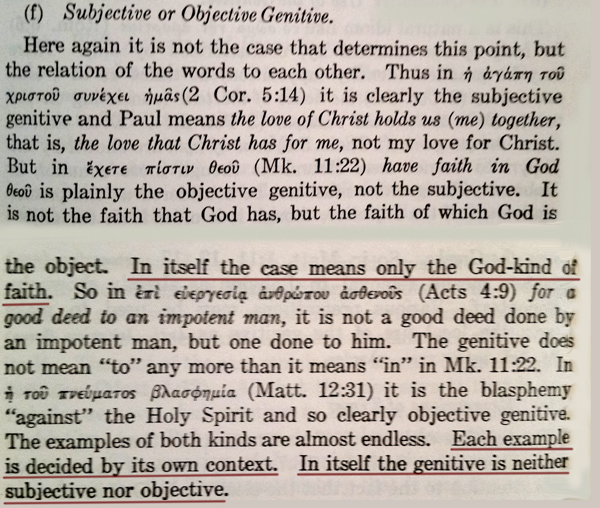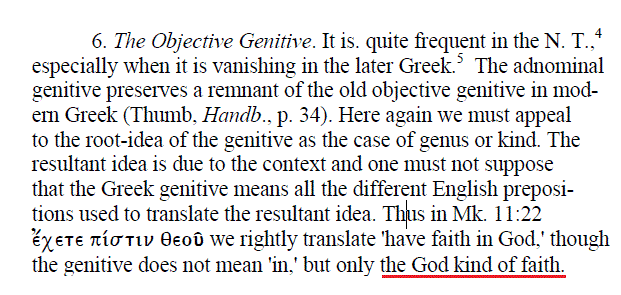Mark 11:22
In the book that is undoubtedly the biggest selling anti-WoF book on the market, one critic discusses the teaching that in the original Greek Jesus actually said “Have the faith of God” or “Have the God kind of faith” in Mark 11:22 rather than the more common translation of “Have faith in God.” He then cites the Greek scholar A. T. Robertson discussing the Greek genitive theou, and says:
In essence, Robertson says an objective genitive means the noun (in this case, theou) is the object of the action. So, in Mark 11:22, God is the object of faith. This requires that the passage be translated “Have faith in God.”
You quickly reason that for the Faith teachers to be correct, a subjective genitive is needed. In that case God would be the subject of faith and the text should read “the faith of God.” But Robertson insists that such a translation is preposterous.
Did Robertson say that such a translation would be preposterous? I wanted to know, so I looked for the word “preposterous” in my copy of the book cited in the critic’s footnotes, Robertson’s “A New Short Grammar of the Greek New Testament” and couldn’t find the word once. Here’s the actual quote from Robertson’s book.

Robertson actually states here that the literal translation is “the God-kind of faith”, just as Kenneth Hagin stated based on the margin of his bible. Notice also that Robertson stated that the choice of “faith in God” (objective) or “faith of God” (subjective) is determined by the context. Even Greek scholars like Robertson have to resort to interpreting the bible based on their theological viewpoint.
In Robertson’s book “Grammar of the Greek New Testament in the Light of Historical Research.” we again find no such use of the word “preposterous”. To the contrary, we again find a reference to the very expression used in the Word of Faith Movement.

This is a bit difficult to interpret. Robertson wrote this book in 1914, so he spoke as one would expect a Greek scholar of that day to speak. Unfortunately he passed away in 1934 so we can’t ask him to clarify what he said, but basically he seems to be saying again that although the literal translation would be “the God kind of faith”, it’s translated “faith in God” due to the context.
So it would appear that the translator has to determine from the context whether to consider the genitive theou (“of God“) as subjective or objective. Robertson’s opinion is that the correct translation would be the objective, and indeed most translators chose to translate it in the objective as “Have faith in God”. There are several versions that have it translated in the subjective, however. Let’s look at a few.
“And Jesus answering saith to them, ‘Have faith of God” (Young’s Literal Translation)
“And Jesus answering, saith to them: Have the faith of God.” (Douay Rheims Bible)
And Jesus, answering, saith unto them, “Have the faith of God.” (Worrell New Testament)
“And Jesus, answering, said to them, Have God’s faith.” (The Bible In Basic English)
“He responded, “Have the kind of trust that comes from God!” (The Jewish New Testament by David Stern)
In Albert Barnes’ notes about this verse we read:
Verse 22. Have faith in God. Literally, “Have the faith of God.” This may mean, Have strong
faith. or have confidence in God; a strong belief that he is able to accomplish things that appear most difficult with infinite ease, as the fig-tree was made to wither away by a word.
{2} “Have faith in God” or, “Have the faith of God”
Adam Clarke’s comments are:
“Have faith in God – Εχετε πιϚιν θεου is a mere Hebraism: have the faith of God, i.e. have strong faith, or the strongest faith, for thus the Hebrews expressed the superlative degree; so the mountains of God mean exceeding great mountains – the hail of God, exceeding great hail, etc.”
W. B. Godbey’s comments:
“And Jesus, responding, says to him, have the faith of God.” There is a difference between faith in God and the “faith of God,” the latter being a perfect faith, admitting no admixture of doubt. In justification, we have faith in God; while entire sanctification, eliminating all doubt and every other phase of depravity, is characterized by the “faith of God.” Here, Jesus imputes wonderful efficiency to the faith of God.”
The Geneva Study Bible says:
“The faith of God is that assured faith and trust which we have in him.”
Admittedly a literal translation of any particular verse isn’t always best, and every translation presents challenges for the translators. It’s clear however, that there are quite a few Greek scholars who accepted these challenges and chose the literal translation for Mark 11:22, or at least presented it as an acceptable rendering in their comments. It was on this basis that Kenneth Hagin and others cited the literal translation of the verse.
Regardless of how it’s translated or should be translated, the fact is a very relevant comment by A. T. Robertson wasn’t provided, and although he sees the objective genitive as the correct translation he never depicted the use the subjective genitive as “preposterous”. Robertson included in his comments a more literal translation that is perfectly consistent with what many Word of Faith teachers use – “The God Kind of Faith”, and that part was conveniently omitted.
Hebrews 11
The author of Hebrews gives us a history lesson in chapter 11, mentioning several examples of faith in action. He begins with this in verse 3.
“By faith we understand that the worlds were framed by the word of God, so that the things which are seen were not made of things which are visible.”
This is an obvious reference to the Genesis account of creation.
“1In the beginning God created the heavens and the earth. 2 The earth was without form, and void; and darkness was on the face of the deep. And the Spirit of God was hovering over the face of the waters. 3 Then God said, “Let there be light”; and there was light. 4 And God saw the light, that it was good; and God divided the light from the darkness. 5 God called the light Day, and the darkness He called Night. So the evening and the morning were the first day.”
And then in Job 38:11,12 God is asking Job where he was when the earth was being formed, and said
“When I said, ‘This far you may come, but no farther, And here your proud waves must stop!
Have you commanded the morning since your days began …”
The creation of the worlds or “heavens” was accomplished through words, as Hebrews 11:3 confirms. In verses 4-30 we find references to Abel, Enoch, Noah, Abraham, Isaac, Jacob, Joseph, Moses, and Rahab and their acts of faith listed in chronological order.
The critics claim that verse 3 is actually telling us that we understand by faith rather than God creating the worlds by faith. However, this interpretation overlooks the fact that a chronological list of acts of faith follows it. By faith the worlds were framed by the word of God. By faith Abel offered a more excellent sacrifice than Cain. By faith Enoch was taken away because he pleased God. By faith Noah prepared an ark. By faith Abraham obeyed. By faith Isaac blessed Jacob. By faith Jacob blessed the sons of Joseph. By faith Joseph spoke about the departure of Israel from Egypt. By faith Moses forsook Egypt. By faith Rahab hid the Israelite spies.
To say that we understand by faith would not only be inconsistent with the narrative, it would also be contrary to the biblical teaching on faith. The Bible says to trust in the Lord with all your heart, and lean not unto your own understanding. (Prov. 3:5) You don’t need to understand to have faith. You just need the Word of God.
In the preceding chapter the groundwork for this history lesson on faith was being laid, and in verses 22-23 we read:
“let us draw near with a true heart in full assurance of faith, having our hearts sprinkled from an evil conscience and our bodies washed with pure water. Let us hold fast the confession of our hope without wavering, for He who promised is faithful.”
Notice the principle of believing with the heart and the confession of faith. This is seen in several other passages of scripture.
“I believed, therefore I spoke…” (Ps. 116:10)
“ that if you confess with your mouth the Lord Jesus and believe in your heart that God has raised Him from the dead, you will be saved. For with the heart one believes unto righteousness, and with the mouth confession is made unto salvation.” (Rom. 10:9,10)
“And since we have the same spirit of faith, according to what is written, “I believed and therefore I spoke,” we also believe and therefore speak,” (II Cor. 4:13)
Then in Romans 4:17 we read “…God, who gives life to the dead and calls those things which do not exist as though they did …” Again we see God speaking something forth in the context of faith.
Which brings us back to Mark 11:22. Is God the object of faith, or the subject? In other words, does God have faith or is faith just something that we have in Him? Hebrews 11:3 indicates that God operates by faith in His words. Jesus is God, and when He spoke to the fig tree it withered and died. He obviously had faith in His words.
Somehow the church world has defined faith as simply trusting in God the supreme being, but God and His Word are one. (John 1:1) Faith in God is faith in His Word, and faith in His Word is faith in Him. You can’t separate them. So if faith in God is the same as faith in His Word, why would it be wrong to say that God has faith? If anybody has faith in His words He does. He used His words to create the universe.
This is not merely a metaphysical or New Age concept, as it is clearly substantiated by the Bible. The problem is that we in the West have lost much of the mindset of the world from which the Bible originated. The Bible was written by people who were familiar with the power of faith filled words. Moses wrote about Noah cursing Canaan, and the Canaanites did in fact become the servants of the descendants of Shem. Moses also wrote the story of Jacob stealing Esau’s blessing. Esau was so convinced that Isaac’s words would come to pass that he wanted to kill his brother Jacob for what he had done.
This is not to say that the faith of God is a magic wand that you wave around to get whatever you want. As you read through Hebrews 11 you’ll see that the heroes of faith didn’t always have it easy. Living by faith is a constant battle, and enduring hardship is a big part of it. (II Tim. 2:3) But as we have seen, believing in your heart what God has said and speaking it forth is how it works.
Again, regardless of how you interpret Mark 11:22 this isn’t an essential doctrine of the Christian faith, and there is no need to brand somebody who subscribes to the “faith of God” interpretation as heretics or “cultic”. Faith in the substitutionary work of Jesus is what’s important. Nobody’s going to hell because of how they interpret this one verse. We should be able to disagree on this without rabid name-calling and accusations.


EXCELLENT! EXCELLENT! AND VERY SOUND A DN ACCURATE TEACHING OF GOD’S WORD! Thanks
Thanks Dane. Blessings!
Thanks, Rod! Great reasoning and arguments. Refreshingly sound logic.
For example, Hebrews 11 consistency observation is something that I have never thought of. Of course, God has faith.
Thank you for posting this. Defrnding the faith is an impotant service to the Body of Christ. I look forward to reading your book.
Thanks for the support, Steve. Have you checked out my YouTube channel? https://www.youtube.com/channel/UC7d_jPXSFkeYUV2BFnkMsMA/videos
This is incredible! Hebrews 12:2 says that Jesus is the author and perfecter of faith. He is the one that authored/designed faith itself and made it so that it is the way through which He does things. Jesus is very clear in Mark 11:23 “truly I tell you, if ANYONE…” He did not say “if you..” in reference to only His disciples. He said if ANYONE. It is the reason anyone that has faith is able to move mountains. Not just those that follow Him. All other truths see but a glimpse of this. Their faith is limited to their own understanding, mortality and desires. But God like faith delves into the infinite and makes ALL THINGS POSSIBLE. Its like the difference between a grenade and an atomic bomb. Thank you so much for sharing this. It has blessed me tremendously. May God continue to bless you with His wisdom and understanding.